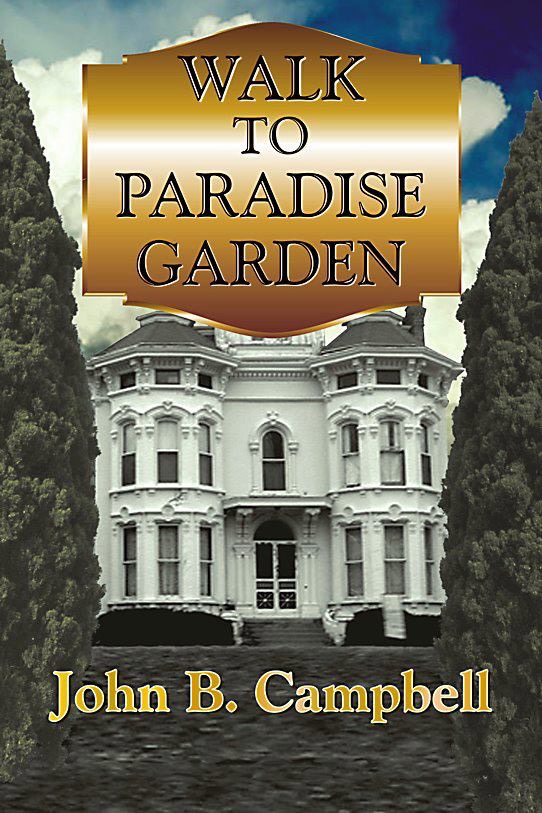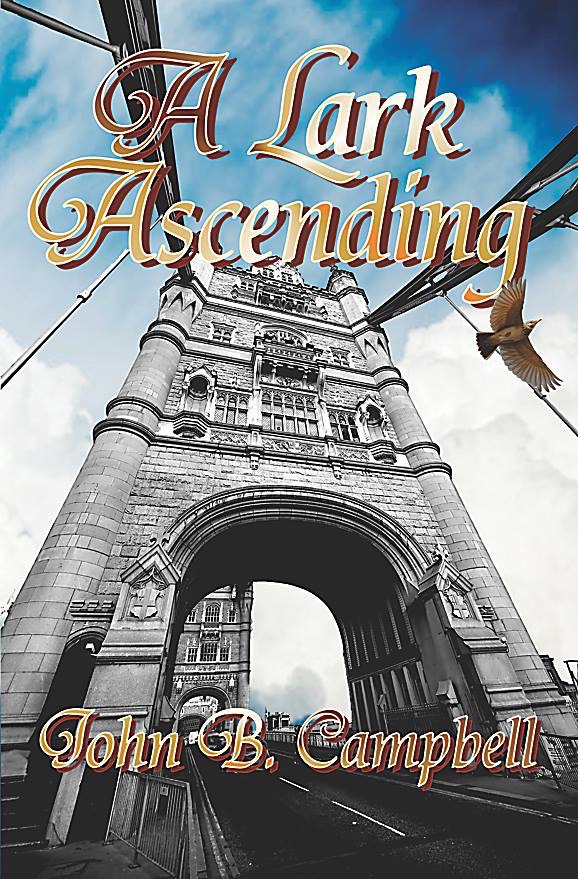I’d like to introduce you to the one-hundred-and-first interviewee in my ‘Meet the Author’ series. He is John B. Campbell from the U.S. (Wisconsin).
Your books dramatize the impact of the great war on society. Can you tell us more about that? What is it that interests you about that time period?
As we know, the Great War catapulted most of humanity into a different world. Fictional characters that are set in this time period are forced to come to terms with many sudden changes. This, I believe, provides the makings for a rich story. Fans of films like The English Patient—and, of course, followers of Downton Abbey—would agree that the period is a romantic one.
A degree of modernity enhances the historic ambiance in the Between-the-Wars time frame, which can be both interesting and practical in a story. And this era connects with our lives more so than earlier periods, I think, in that most readers personally knew individuals—grandparents and others—who had lived through those years. Perhaps such readers have mementos or recall observing as children various mundane things that carried over and touched their lives. Thus, many find this era more intimate; it can perhaps strike a chord more profoundly within us.
I’m getting ready to read your debut novel, the family saga Walk To Paradise Garden. Can you tell us about the story?
Walk to Paradise Garden is a saga that bridges the old world with the new—life on both sides of 1914—as we meander through time with John and Evie Armitage.
I mostly read mysteries, yet my debut novel is a saga. As I was considering my options, I became fascinated with biographies of those whose lives spanned interesting times, such as conductor Arturo Toscanini. In his case, to have been surrounded by formal decorum as he interacted with royal courts, like Imperial Russia, to have observed firsthand the rise and fall of Mussolini and other “despots”, to have experienced progressive changes in transportation and communications—and then live to see the birth of rock and roll and the gyrations of Elvis Presley—what an interesting lifespan.
The story of John and Evie involves not only their initial romance but the fulfillment of a broader love throughout their lives; after the Great War they take on added purpose as philanthropists, ultimately by establishing better educational opportunities for disadvantaged children around the world. Through this, they experience the joys of an extended family and endure some tragedies. One calamity is particularly horrific. As they grapple to recover, help comes to them through a special needs boy. The theme of this historical fiction journey spotlights the beauty of generosity and resilience.
A Lark Ascending is the first in a new mystery series set in London in 1921. Can you tell us about the story?
Yes, so now I am working with my first literary love—mysteries—British mysteries. My protagonist in this series, the first book being A Lark Ascending, is a 13 year-old boy. Malcolm Roberts has a genteel background but encounters circumstances that leave him to his own devices in some of London’s seediest areas: Whitechapel and Limehouse. I enjoy working with dark alleys and fog and all that we love about historic London. The ideals in this novel are about resourcefulness and courage. We see these dramatized as Malcolm encounters bullies, loneliness, and xenophobia.
Like me, you live in the U.S. but set your books in other countries. Does that require a lot of research? What makes you choose those settings?
The internet has proven to be invaluable for research but I still enjoy libraries and old, dusty bookshops, as well. As to my fondness for British mysteries, we might ask: what factors create an Anglophile? That’s an interesting question for each Anglophile to ponder.
I try not to lose sight of the aim to entertain my readers. So, in addition to my personal fondness for historic London, I also try to amuse or charm with how I evoke a setting. In both of my published novels, we experience different levels of society in London, from Chinese laundries to East End synagogues to highbrow galas. In Walk to Paradise Garden, we also take a detour to Madagascar for an exotic sampling.
Your books have a lot of great reviews. Do you have a favorite? If so, would you share it with us?
I appreciate every review of my work. Here are three snippets that especially delighted me—all for Walk to Paradise Garden.
From Casee Marie of LinteryInklings.com: I felt that I was truly immersed in the history of real people – I’ll admit, by the end I had to remind myself that they were, sadly, fictitious – and that the story unfolding in front of me was one of notable importance. It’s as poignant and enchanting as a lifetime, and its message leaves the pages to take root in the heart of its reader.
From Katherine Ashe (on Goodreads): Here is a book that is absolutely addictive reading and a joy to bring into one’s life … Before publishers began a contest among themselves to find who could “capture the market” with the most violent and vile books, reading was looked upon as a healthy broadening of the mind, a view into how people coped with the challenges of life without succumbing to bitterness or loathsome appetites. This is a book that gallantly opposes that ugliness and horror with a riveting story of kindness.
And it’s superbly written. Campbell’s extraordinary strength as a writer is in the details, never so much as to weigh the pace, but precisely the amount to create a perfectly vivid, cinematic picture. Do furnish your mind with this fine and thought provoking story.
From the Historical Novel Society: … From there, Walk to Paradise Garden spans the subsequent 86 years of their lives, highlighting triumphs and heartbreaks through a series of vignettes. Although one might assume that Campbell’s style of presenting John and Evie’s story would create a choppy and disconnected reading experience, the opposite is true. Common threads woven through the plot provide continuity and stability to the story while adding depth and interest. Likewise, the artfully designed cover supports the plot with an aura of understated gentility. A story of enduring love and selflessness with a touch of mystery and suspense, Walk to Paradise Garden is a pleasant reading experience, like taking a stroll through a beautifully manicured garden.
The reviews for A Lark Ascending have been encouraging. Lark was released last October. Of its reviews, Casee Marie’s is quite wonderful. (I feel honored to have received two from her, each for her book site, literaryinklings.com). But again, I appreciate each and every review and reviewer.
Would you give us a brief excerpt from one of your books?
Excerpt. Here is the opening to A Lark Ascending:
London’s East End 1921
He landed in an alley. A cat shrieked; its complaint shredded adolescent nerves that were already on edge. If the mangy creature hadn’t caterwauled, the boy might have escaped detection.
The cat took off, scuttling like a rat in the dark warren of London’s East End. It probably felt threatened—Malcolm Roberts certainly did. As he righted himself and slid through a narrow passage, something snatched at his shirt. Fear flashed hot through his body. Then the material ripped, releasing him. He hurried between buildings with a sharp pain awakening at the top of his shoulder. Must’ve been a nail; must’ve sliced my skin.
The sound of boots scraping against brick and grunting expletives told him the bullies were scaling the wall in pursuit.
Malcolm shot out on White Horse Road and realized he had the choice of returning to his home in Stepney or hightailing it to the Limehouse riverfront. Which should he choose?
His earlier decision had caused this mess. Unable to ignore his curiosity, he’d followed the group of ne’er-do-wells, proud of his ability to shadow suspects almost as well as his penny-dreadful hero, Detective Phoenix.
Their operation was almost completed when he sneezed.
Malcolm cursed his sneeze—and his curiosity.
His life depended on making the right choice now. Those thugs would prove as determined as angry bees. Although street noise swallowed up their racing footfalls behind him, Malcolm knew he had to keep going. Should he run to his father or his friend?
If Joe Hasani was docked at his berth, Malcolm could escape across the Thames, putting real distance between himself and the hoodlums.
Malcolm headed for the waterman, running like a thieving urchin.
Along White Horse, he wove and jostled his way against the oncoming throng, aware that the crowd would likely thin out as workers headed for home or pub.
He ducked into a nearby alley and moved with caution through its blackness. The pounding pulse in his ears complicated all efforts to listen for trouble. Unseen bits of rubbish squished and crackled beneath his shoes while its stench rose like a grimy hand, intent on smothering him. Water dripped from rotting rooftops. Something moved, just ahead. A human form. Malcolm gasped then realized it was a woman. He knew the type and continued onward.
“A heavy breather, I see.” She reached out with fingers fluttering along his arm, an affront as unwelcome as her rank odour. “What a handsome young man you are.” He sprinted out and across the next street.
He darted this way then that, sure that the louts had split up in their search. Needing to keep apace toward the river, he rounded a corner. Panic surged at the sound of his own footfalls, echoing up from the pavement, bouncing off walls, and betraying his presence beside Lambert’s warehouse.
“There ’e is!” The voice ricocheted off brick and water, distorting its distance and direction.
As the river appeared ahead, Malcolm broke out in a profuse sweat. There were no shipments coming or going along the immediate stretch. And he was in plain sight.
“I’ll go round and head him off.”
“Oi’ll get ’im first!”
The docks loomed ever closer. One way or another, the chase would end. He prayed Joe would be there. Malcolm’s chest and throat burned raw. With alarming hints of wobble, his lower limbs begged for relief. Dampness glistened on the cobbles. He bolted for a gap near the docks then lost his footing. His head hit the ground. He tried to get up but instead flopped like a stunned fish. Urgency broke through his muddled thoughts. He shot up, poised to sprint.
Footfalls and heavy breathing filled the air.
He dashed around a stack of crates. “Joe, Joe! Are you there?” Empty carts and wagons blocked his view of the waterman’s post.
“Got my knife ready. I’ll slash him first!”
“Oi’ll have ’im dead long before you get ’im.”
“Oh, please be there, Joe,” Malcolm cried to himself.
He rounded a parked lorry—the boat was gone. Malcolm gazed desperately over the Thames. Then he spotted Joe, out on the water, bobbing toward him, rowing hard.
The thugs gained more and more ground.
“Joe, I’m coming! Help me!” Malcolm ran down the pier. If he slipped, he’d be caught and flayed alive. He knew it.
“Joe!”
Malcolm kept running. Just before reaching the end, and with surprising strength, he dove into the river. The cold water shocked his limbs and they almost failed him. Then, his attempts to tread water took purchase but waves washed over his face, repeatedly blocking sight of Joe.
The ferryman heaved at the oars. Malcolm hoped Joe had heard him, hoped he wouldn’t row right over him.
Jeering cries cackled from the end of the pier, but no sounds of anyone diving in followed. Malcolm thanked Heaven as he struggled to keep his head above water.
Joe angled his boat closer.
A wave slapped Malcolm’s face and he swallowed a mouthful of foul river. He spat; then a coughing fit sapped his strength. Water closed over his head. Though his arms were moving, he sank. He felt a nudge, then another. Some bloated thing sidled next to him then bumped his arm with its slimy flesh. The horror of a nuzzling corpse galvanized Malcolm. His weary legs thrust again. Surfacing, with water dripping before his eyes, he saw an oar.
“Grab it! Come on, boy. Grab it.”
Malcolm stretched for the oar. He grasped it. Ensuing relief buoyed him somehow, but he had never climbed into a boat from the water before. Joe pulled him up to the side.
“Can you get yer foot up, boy?”
Gripping the gunwale, he tried to kick into position. The bloated body seemed intent on sticking to him. “Augh!”
“The bloody Thames,” Joe cried. “Come on, lad.”
Malcolm’s next attempt failed and his legs went under the boat’s keel.
“Kick out!”
With greater force, he swung his right leg out and up. He almost hooked his heel over when the slimy corpse slid along his back, distracting him. “Augh!”
He swung again and was up, up and over. The moment’s exhilaration crashed when knees and hands struck the rocking wooden hull.
“Can you sit up? There you go. Here’s a blanket; it’s a wee bit damp but a helluva lot dryer than you be.”
Malcolm regained his balance, despite light-headedness, pain and burning lungs. His gaze shifted to the corpse bobbing off and away. He swallowed down a swell of nausea.
“We’ll leave that floater be. I’ll get you away from that lot at the docks. No need to report the matter. The police’ll be of little use. You know how I feel ’bout them, and ’bout one in particular.” Joe’s voice softened. “Lessee, I’m headin’ for Wapping Old Stairs, I am, where I’ll set you down before a nice fire. Town of Ramsgate, me favourite pub. Some brandy in yer tea’ll help get you straight and ready to go home.”
Joe Hasani had come to London’s East End from the Balkans at such a young age that he spoke like a reg’lar, like the average docker at the port. Malcolm didn’t fully understand the bond they enjoyed, but he suspected it came from a pain neither had ever revealed. Perhaps each in his own way felt like a foreigner.
Are you working on a new book? How many books do you have planned for your mystery series?
I am presently doing research for Malcolm’s next adventure: In These Distracting Times. I’ve written a few scenes, mostly to engender ideas. Two segments involve a love interest. There was a love interest in Lark. Malcolm is mature for his age while yet being full of boyish whimsy. So, these interests are early yearnings. In Distracting Times, the girl who attracts him is the daughter of a printer, a man who prints anti-government leaflets.
I learned from author Will Thomas the value of analyzing the social issues of the day when embarking on writing an historical novel. This is the kind of thing I am still researching for this book.
I also have a story in mind that has Malcolm as an adult during the Battle of Cable Street (1936), but I’m not yet sure how many adventures and agonies are in store for the lad before that. I would guess that I might do four Malcolm mysteries and then move on to something different.
Do you have a writing routine?
A routine? No. I admit that I should be at my desk regularly. I’ve considered getting a chain and manacle. However, like many writers, much of my work is done while prone on the sofa as I think about my characters. And, perhaps this is a little odd, but a lot of what ends up in my stories comes from peripheral, obscure impressions or thoughts that occur unbidden while I’m busy doing other things, like driving. Fortunately, I’ve not had any car accidents lately.
While at the keyboard (I only write at the keyboard), sometimes words come together slowly and painfully while at other times the finger tapping is fast and furious. I realize that this experience is pretty common.
What is your favorite or least favorite part of writing?
My favorite part of writing comes after producing something exceptionally beautiful, humorous or poignant.
My least favorite part is after realizing that one of my “beautiful segments” is actually rubbish.
Editing is a bear. But I edit my heart out often and then pay dearly for more than one professional edit. I do this because I am hoping to end up with a work of art.
Author Bio:
John B. Campbell’s stories dramatize the impact of the Great War on society. His debut novel Walk to Paradise Garden bridges the old world with the new by means of a family saga. A Lark Ascending is the first of a mystery series, featuring an adolescent named Malcolm Roberts. Left to his own devices in London’s East End in 1921, his locale and the post-war backlash present Malcolm with enough adventure to last a number of episodes.
Campbell lives in eastern Wisconsin with his wife Pam and their two dogs.
http://johnbcampell.weebly.com/
http://www.amazon.com/Walk-Paradise-Garden-John-Campbell-ebook/dp/B007BGZN30/ref=asap_bc?ie=UTF8
http://www.amazon.com/Lark-Ascending-John-Campbell-ebook/dp/B00OV9TNF4/ref=sr_1_7?s=books&ie=UTF8&qid=1427632680&sr=1-7&keywords=John+B.+Campbell




5 Comments
March 30, 2015 at 12:07 am
I enjoyed the interview. I must purchase these two soon! Your research and descriptions of London have gotten my curiosity churning.
March 30, 2015 at 1:55 am
Thanks, Sara. I’ve started reading both of John’s books.
March 31, 2015 at 2:37 am
Thank you, ladies. And thank you, one and all, for reading this interview. Doesn’t Susan do a great job?
March 31, 2015 at 2:11 pm
It’s been wonderful to observe a friend honing such a beautiful talent as John has. Even nicer to taste the fruitage of the final product! This interview brought to light things I didn’t know before but add meaning to what I read now. Thank you both.
April 4, 2015 at 12:59 pm
Great books. Fantastic author, and friend.
John has always been very supportive of other author’s and their endeavours. And his writing is first rate.
CDA